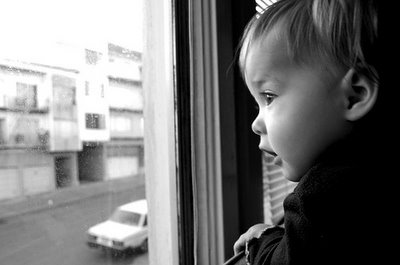Every day it seems like we watch the world form itself anew in her eyes. Synapses crackle, patterns emerge. Cresting Lone Mountain the other night on our way home from the Haight, the fullish moon emerges from its spot low on the eastern horizon and she is in the crook of my arm, pointing at the moon between some blunt apartments and St. Ignatius, and she says "ball" in a voice that is startlingly sure of itself.
That's right Juniper, it is a ball. So is the circle I draw in the condensation obscuring our favorite window every morning when we look out onto the quiet street. Just like the globe on the shelf at the coffee shop, and the stemless cherries in the last book we read before I let you turn off the light at night. Sometimes you see a ball when we're out walking somewhere, and I can't tell what you're talking about, your eyes filled with whole worlds I cannot see, though you still find words to define patterns; describe memories; create metaphors.
The barbaric yawps of your infancy have given way to words. No longer content to passively howl, begging for warmth and attention, you are finally able to control your world a little by naming the things you know. You coyly grin when you say something that makes sense, seeking acknowledgement and hugs.
The Greeks had a word for those who could not speak Greek: βαρβαρος (barbaros). It is often said the ancients listened to the languages of other tribes dragging their wares for trade from beyond the Caucuses and could discern little but the sound "bar bar." It came to mean "foreigner" to the Greeks, and came to us later as barbarian. But it all boils down to the Proto-Indo-European root "ba ba," a word "imitative of unarticulated speech," and also the root of our word baby. And babble. The Greeks were snobs. They believed anyone who didn't use their alphabet spoke like an infant. A word itself that comes down to us from the Latin infans, which means "incapable of speech."
Roman Jakobson once wrote that the sounds all babies first make to form words across all cultures arise from nursing, which is often "accompanied by a slight nasal murmur, the only phonation which can be produced when the lips are pressed to mother's breast or to feeding bottle and the mouth is full." With time, that phonation is repeated and expanded as a manifestation of any desire. I think that makes sense considering the frustrating early declarations and demands that Juniper articulated as mmm-mmm-mmmms and nnn-nnn-nns. But now we are in new territory; Juniper has officially moved even beyond the bilabial plosive. Desire does not fully explain the tangible pride she gets from expressive speech, which seems to me less driven by desire than by self realization. Juniper has recently learned the word, "eye" and I can't help but wonder about its homonyms, both for affirmation and identity.
New words fall neatly into place in her burgeoning lexicon almost every day. Light. Hi. Bubble. Nouns make way for prepositions (up) which she also manages to use as an adverb, an adjective, and an imperative verb. "Up!" she barks at 6:40 a.m., seated between Wood and I in bed, banging her tiny fists against our bellies. "Up!" she orders, with her hands reaching into the air. "Up!" she exclaims when we climb stairs. Before we bring her to our bed, we hear her in her crib talking to herself, running through the list of words she knows like a college sophomore before a French quiz. She wakes to muted daylight and the desire to speak.
It is so exciting to watch Juniper brush aside the confusion and chaos of infancy. What a responsibility we have, in teaching her to communicate, in helping her to overcome frustration and express her desires, emotions, fears, and hopes. After so many months of speculating, I can't explain the joy that speech provides as a window into her untapped little mind.
But it is terribly frightening also. It is easy to gauge the progress of her expressive speech, but her receptive comprehension is more elusive. What does she understand about what we say? When Wood and I argue and she watches us, how much of the timbre and strange levity in my voice does she pick up as anger? Sometimes we'll say a word that sounds like frog and she'll dart her tongue out rapidly like we have taught her to do. If we say horse she bucks her body like a redneck on a mechanical bull. What an awesome responsibility it is, suddenly, to speak.
She is still very young, and there is so far to go. And yet the limits of her speech also show just how much she knows. The moon is a ball. The sun is a light. She sometimes calls our window dada because it is through that glass we wave goodbye each morning, over and over until I've crossed the street and disappeared, and it is through that glass that she watches, waiting for me to walk home from work in the evening, waving to her as I approach.



























